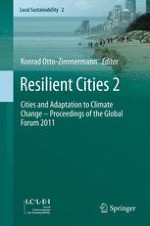2012 | OriginalPaper | Buchkapitel
The Significance of Adaptation Framing in Local and Regional Climate Change Adaptation Initiatives in Australia
verfasst von : Hartmut Fünfgeld, Bob Webb, Darryn McEvoy
Erschienen in: Resilient Cities 2
Verlag: Springer Netherlands
Aktivieren Sie unsere intelligente Suche, um passende Fachinhalte oder Patente zu finden.
Wählen Sie Textabschnitte aus um mit Künstlicher Intelligenz passenden Patente zu finden. powered by
Markieren Sie Textabschnitte, um KI-gestützt weitere passende Inhalte zu finden. powered by
